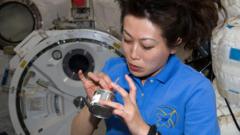A pioneering mission led by the European Space Agency (ESA) has embarked on a quest to cultivate lab-grown food in the unique environment of space, potentially revolutionizing how astronauts dine. This experiment, launched aboard a SpaceX Falcon 9 rocket, is designed to evaluate the feasibility of producing nutritious meals in low gravity and high radiation conditions.
The groundbreaking project has been initiated with hopes of addressing the staggering costs associated with feeding astronauts, which can reach an exorbitant £20,000 per day. Central to this initiative is Dr. Aqeel Shamsul, CEO of Frontier Space, who shares the aspiration of establishing food production facilities on the International Space Station (ISS) and eventually on Mars. "Our vision includes factories floating in orbit and on the Moon, enabling consumption of freshly grown food," stated Shamsul.
Lab-grown food technology has already presented viable options on Earth, producing ingredients like proteins, fats, and carbohydrates from simple cell cultures. Notably, lab-grown meat products like chicken are already available in some markets, and steak is awaiting regulatory approval in various regions including the UK and Israel. In space, however, the motivation pivots primarily on cost-effectiveness and sustainability.
While traditional rocket shipments of food will suffice for the present, as long-duration missions to the Moon and Mars materialize, the logistics of feeding crews of hundreds becomes daunting. "To mitigate costs, growing food on-site makes much more logical sense," Shamsul explained. The focus can shift from basic rations to more diverse options, such as protein-enriched mashed potatoes evolving into more complex cuisines.
To realize this dream, ESA researchers sent a compact bioreactor into orbit to determine if the fermentation processes can successfully adapt to the adverse conditions of space. This bioreactor, containing specially engineered yeast capable of producing vital nutrients, will provide essential data for the development of larger, more sophisticated equipment aimed for future missions.
Culinary experts at Imperial College, including culinary designer Jakub Radzikowski, are also preparing for the future of space dining. Though currently restricted from using lab-grown ingredients, he is innovating with theories around future culinary creations that could tantalize astronauts' palates from various global cuisines once approvals are secured.
In a recent taste test with the UK's first astronaut, Helen Sharman, the samples displayed promising potential for flavor and appeal. Sharman, who recalls the often monotonous and unappetizing food options available during her missions, expressed enthusiasm for the enhanced options that lab-grown ingredients could provide, which could also alleviate weight loss issues faced by astronauts.
The results from this pioneering experiment will assist in shaping the future of food production in space, paving the way for a sustainable and varied diet that could support humanity's aspirations of becoming an interplanetary species. "The ability to tweak and personalize nutrition would greatly enhance the well-being and performance of astronauts on long missions," Dr. Sharman said. The journey for lab-grown food in space may have just begun, but its implications could be as vast as the universe itself.

















